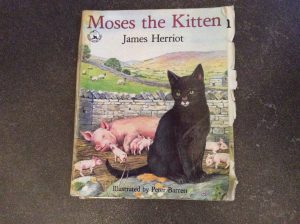It’s good to read!
 Exactly 100 years ago today, veterinary surgeon and author James Alfred Wight, better known by his pen name, James Herriot, was born. James’ books, based on his life as a country vet, are educational and entertaining, providing an insight into rural life in 1930s and 1940s Yorkshire, and rich with colourful descriptions of people and places. He was an author with a skilful ability to transport his readers to the scene, as though they were standing beside him, listening to the farmer speaking with a thick Yorkshire accent, feeling the biting wind sweeping down from the fells, experiencing the sights and smells of the barn.
Exactly 100 years ago today, veterinary surgeon and author James Alfred Wight, better known by his pen name, James Herriot, was born. James’ books, based on his life as a country vet, are educational and entertaining, providing an insight into rural life in 1930s and 1940s Yorkshire, and rich with colourful descriptions of people and places. He was an author with a skilful ability to transport his readers to the scene, as though they were standing beside him, listening to the farmer speaking with a thick Yorkshire accent, feeling the biting wind sweeping down from the fells, experiencing the sights and smells of the barn.
The year I turned three, my uncle and aunt gave me ‘Moses the Kitten’ for Christmas, an illustrated story taken from one of James Herriot’s full-length books. I loved that book. The signs of my affection for it are evident in the worn and tattered cover, the spine stuck with yellowed and crumbling sellotape and the loose and dog-eared pages.
When I picked up and re-read the book last year, I was amazed. Some pages are 150 words long. Others contain words and phrases such as ‘connoisseurs’, ‘incongruous’ and, my personal favourite, ‘the porcine element of his diet’. This book breaks every rule about writing for young children! Yet, for three-year-old me, this didn’t seem to matter. The soft pictures, the heart-warming story, and the comfort of being read to, seemed to outweigh any difficulty I had in understanding every word.
I still love books, and I relish coming across new and unknown words. Reading is a sure way to expand one’s vocabulary. When you’ve seen a word used in context, it tends to stick much better than simply learning by rote what certain words mean.
Many studies have been carried out to investigate the link between vocabulary and reading, and the results are clear – reading improves vocabulary. Other studies show that higher levels of vocabulary positively affect educational achievement, and those with larger vocabularies may even have higher IQs!
So, I urge you, read! There are so many ways to get books nowadays – ebooks, audiobooks and traditional paperbacks. It has never been more easy or less costly to find books to read. If you have children, read to them, and, when they learn to read for themselves, encourage them to keep reading. Put good books into their hands. Build their vocabularies and improve their reading ability.
You never know – your child may just be the next James Herriot!




Joanne Grattan
11/11/2016 at 22:17Thanks for this recommendation Ruth! Keep them coming! Going to get this for Eloise when she turns three.
Never mind James Herriot, she might be the next Ruth Chesney 😉
Ruth Chesney
13/11/2016 at 20:45Haha! I’m sure Eloise is going to be much more talented and famous! ?